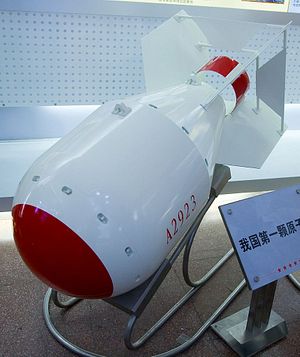North Korea had its fourth nuclear test in January 2016, followed by a satellite launch in February, though the latter is widely suspected to be a disguised ballistic missile test. Given the “special relationship” between Beijing and Pyongyang, many Chinese are understandably outraged by what they perceive to be a treacherous and ungrateful North Korea.
Why does North Korea insist on developing nuclear weapons despite strong opposition from the United States and China, as well as harsh United Nations Security Council sanctions?
To understand the calculus of decision-making in Pyongyang, it may be helpful to put its nuclear program in a historical-comparative context. China turns out to be a wonderful case for comparison, because the two countries share many important similarities in the historical circumstances under which they pursued their respective nuclear ambitions.
China detonated its first atomic bomb on October 16, 1964. Six days later the People’s Daily ran a front page editorial. Here are a few lines from that 3600-plus-word editorial.
Johnson [the then-U.S. president] reportedly said that having nuclear weapons is a ‘tragedy’ for the Chinese people, because China’s ‘limited resources’ were used for developing nuclear weapons instead of being used for ‘improving the Chinese people’s welfare.’ What Johnson meant to say is that China is too poor to develop such weapons. Imperialists always underestimate the power of the people… We fully recognize that all our resources would merely be spoils for imperialists if we were unable to effectively resist imperialist aggression… If China’s first atomic bomb were a tragedy, then it would be a tragedy for American imperialism, whose dream of enslaving the Chinese people through nuclear blackmail is shattered and whose nuclear monopoly is fundamentally shaken….
To tell you the truth, Mr. Johnson… China possesses something more powerful than the atomic bomb: the invincible Mao Zedong Thought; the glorious, great, and correct leadership of the Chinese Communist Party; 650 million people of strong unity and consciousness; and the superior socialist system. Armed with them we can defeat any enemy… How come the United States—a country that is aggressive by nature—became the gospel of peace when it acquired nuclear weapons, but the peace-loving socialist China becomes a ‘disaster’ for humanity?
These lines offer important clues about Chinese leaders’ state of mind at that time. China back then was probably as impoverished as North Korea is today. The disastrous Great Leap Forward only made things much worse. Nevertheless Beijing was determined to invest immense resources to develop a nuclear bomb, apparently for the sake of deterring “American imperialists.”
In light of ongoing hostility between Pyongyang and Washington, as well as the latter’s adamant opposition to the former’s nuclear program, statements similar to those from the People’s Daily could very likely have been issued by North Korean leaders. Indeed, statements from North Korean television and newspapers as quoted by foreign media seem to confirm this. Like China in the 1960s, an impoverished North Korea also appears determined to be a member of the nuclear club, presumably also because of existential threats from “American imperialism.”
There is another striking similarity between China then and North Korea today. The former Soviet Union was the most important ally of China, whereas China is widely viewed as the most important ally of the “hermit kingdom.” Yet in both cases the junior partner in an alliance has chosen to pursue nuclear self-sufficiency instead of relying on a nuclear umbrella from the “big brother.”
Curiously, the former Soviet Union was not mentioned at all in the People’s Daily editorial, although by then Beijing had already openly split with Moscow. China was not mentioned in any official news source from Pyongyang either, though based on Chinese and western media coverage it wouldn’t be surprising if North Korean leaders’ feelings about China are quite similar to how Chinese leaders felt about the former Soviet Union.
While many Chinese view Pyongyang as ungrateful and provocative, it is highly likely that many Russians viewed China in the same way. Surprisingly, there was no mention of the Chinese nuclear test in Russian newspapers. As it turned out, Nikita Khrushchev was removed from his position on October 14, 1964, just two days before China exploded its first nuclear bomb. Internal power struggle presumably prevented Soviet leaders from paying much attention to the “big bang” in a Chinese desert.
What can we learn from this brief historical comparison of China and North Korea? First we should never underestimate Pyongyang’s resolve and ability to develop nuclear weapons. Resources may be limited, but the mobilizing power of national honor, ideological zeal, and leadership worship can be unlimited. Second, communism as an ideology may be a powerful centripetal force, but the centrifugal force of nationalism is even more powerful. Every communist revolution is first and foremost a nationalist revolution. Scratch the surface a communist and you will find a nationalist underneath. China’s problematic relationship with its three communist neighbors—the former Soviet Union, North Korea, and Vietnam—amply attest to the power of nationalism. Indeed, had Vietnam not been unified, China would likely have a nuclear-armed neighbor to its south.
Instead of condemning Pyongyang as a snake in the bosom, the Chinese are probably better off figuring out why an erstwhile ally has behaved in such a way and what can be done to denuclearize North Korea, if it is not too late yet.
































